Following the 2024 domestic qualification process where teams of four competed over three rounds, the team of Jack Blows, Matthew Eversden, Jeremy Huntley and Callum Lombard along with Coach Jonathan Sewell and Head of Delegation Vince Wills represented England, where they faced 47 teams from around the world.
Held from December 5th to 8th at the Zénith arena on the outskirts of Dijon, the FIPJP proceeded with the familiar format which started with the Precision Shooting on the Thursday and then moved on to the Championships.
Precision Shooting
World Championships debutant, Jeremy Huntley who had realised his long held dream to play for England at this level, was chosen for the Precision Shooting and he performed brilliantly. Chalking up an impressive 35 points in the qualification stage of the five setups that form the discipline, Jeremy found himself only three points short of at automatic qualification into the Quarter Finals, with a number of some very close misses.
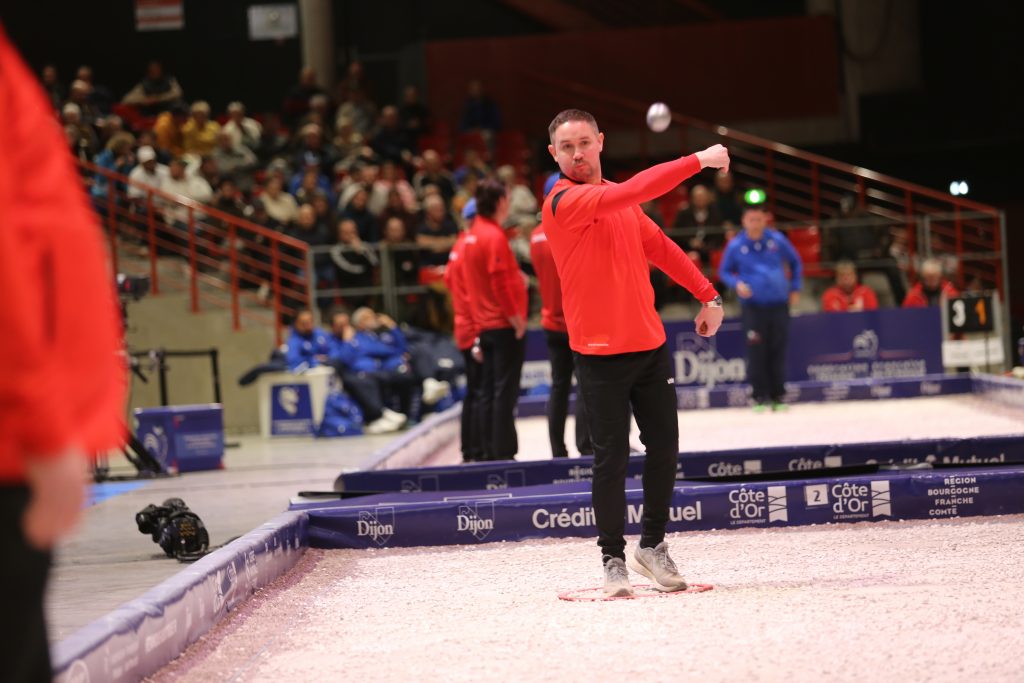
He showed that there was no luck involved at the qualification stage as he again performed to a high standard in the repechage where those players ranked 5th to 20th shot a second time. He added a further 29 points to his cumulative score and with 64 points in total, ended up in 9th position, just missing out by three points again for a Quarter Final place.
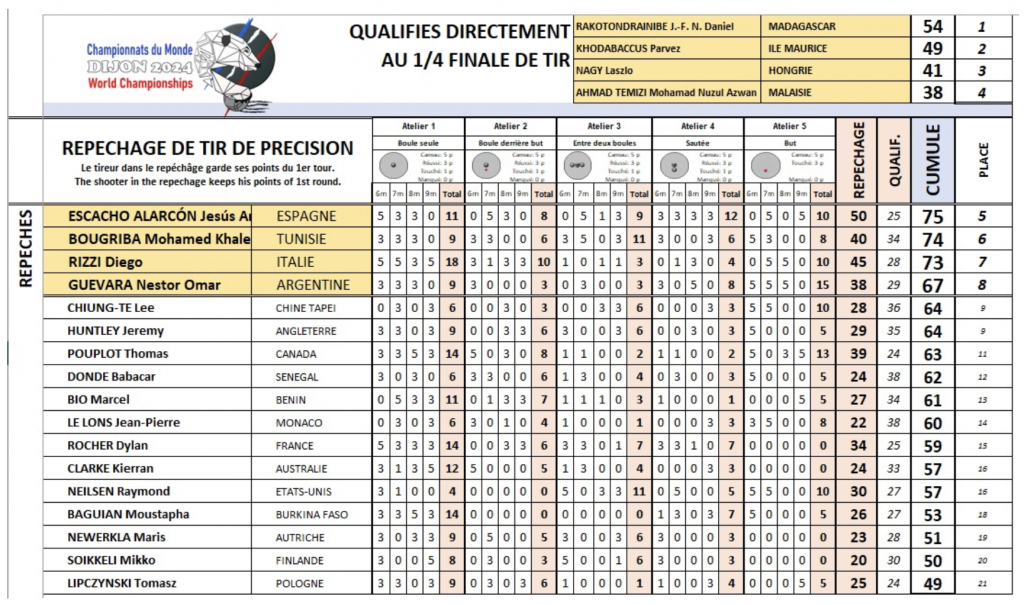
No male English player has ever qualified for a top eight knockout place at the Men’s World Championships and Jeremy’s ranking is the highest that has ever been achieved. He appeared right at home under the lights and in front of the large crowd in the main arena. He was also ranked 4th best amongst European players and finished five points above World Champion Dylan Rocher, who provided the first surprise of the tournament by failing to qualify for the knockout stage.
This was not the only surprise of this competition within the main Championships, as Diego Rizzi of Italy was defeated in the Quarter Finals by Parvez Khodabaccus of Mauritius and Hungary’s Laszlo Nagy, well known in England as he lived and played in our country, won a silver medal shooting fearlessly and superbly. Laszlo only succumbed 32-46 in the Final to the outstanding Madagascan shooter Daniel Rakotondrainibe.
Triples
Buoyed by Jeremy’s excellent performance, England started positively in the first round of the five round Swiss System by defeating the Czech Republic 13-5. The match was the only round held on the Thursday evening and took place in the large tent which was positioned on land adjacent to the main arena. England were always in control in the match.
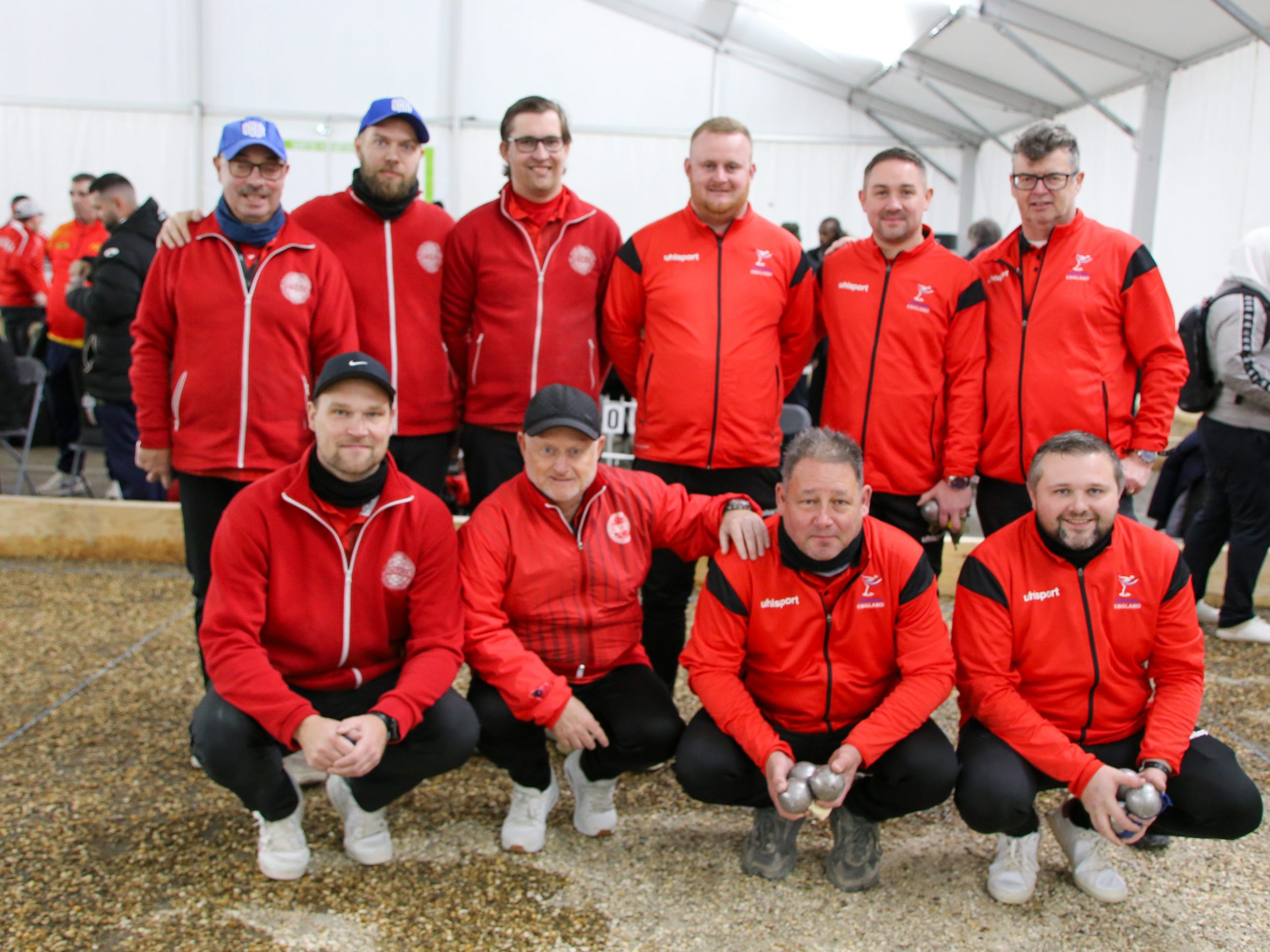
England were back in the tent bright and early the next morning against familiar rivals Denmark. Despite having a number of good chances to take the initiative in the match, England were shaded out 9-13. The Danes have proved to be tough opponents over the years and England have never prevailed at this level when facing the Scandinavians.
Although a setback, England knew that progress in the Championships was dependent on securing a top 24 ranking and that this would be guaranteed if they could win a further two rounds out of the three that remained.
Part of the attraction of the Swiss System is that matches are drawn on a round by round basis and the system seeks to pair teams on the same wins. England’s third round opponents, Taiwan, were also on one win from two, having lost 1-13 to Latvia and defeating Japan 13-3.
For the first time in the Championships, England played in the main arena in front of a large crowd that were intently focussed on the French team who were playing on a nearby pitch. The surface in the main arena was very different to that found in the tent outside, with a much harder sub surface and fewer and larger stones. Unfortunately England seemed to struggle with it and Taiwan played a solid and consistent game. The result was a disappointing 3-13 reverse.
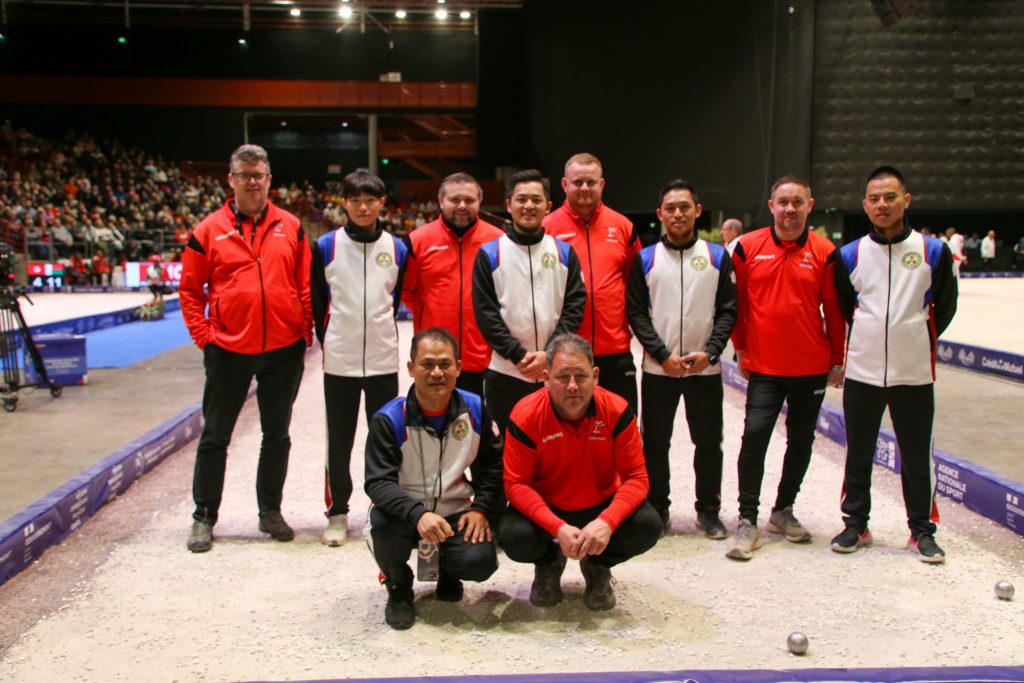
England were faced with the challenge of needing wins in both of the two remaining rounds and the Swiss System gave them a draw against Hungary who at that stage also found themselves on a single win, having defeated Japan 13-1, but suffering two reverses at the hands of strong African opponents Mauritania (eventually ranked 9th in the Swiss) and Ivory Coast (16th).
The match was again to be played in the main arena, and although England improved on their performance against Taiwan, they never seemed to get into top gear against a Hungarian team that was always able to find a good play under pressure even though their shooter was not having the best game. Laszlo Nagy and Karoly Gal, well-known to the England players from their time playing in our domestic circuit both played well to ensure that England were never able to secure a foothold in the match. The 7-13 defeat meant that England would not be in the final stages of the Championship and placed instead in the secondary competition, the Nations Cup.
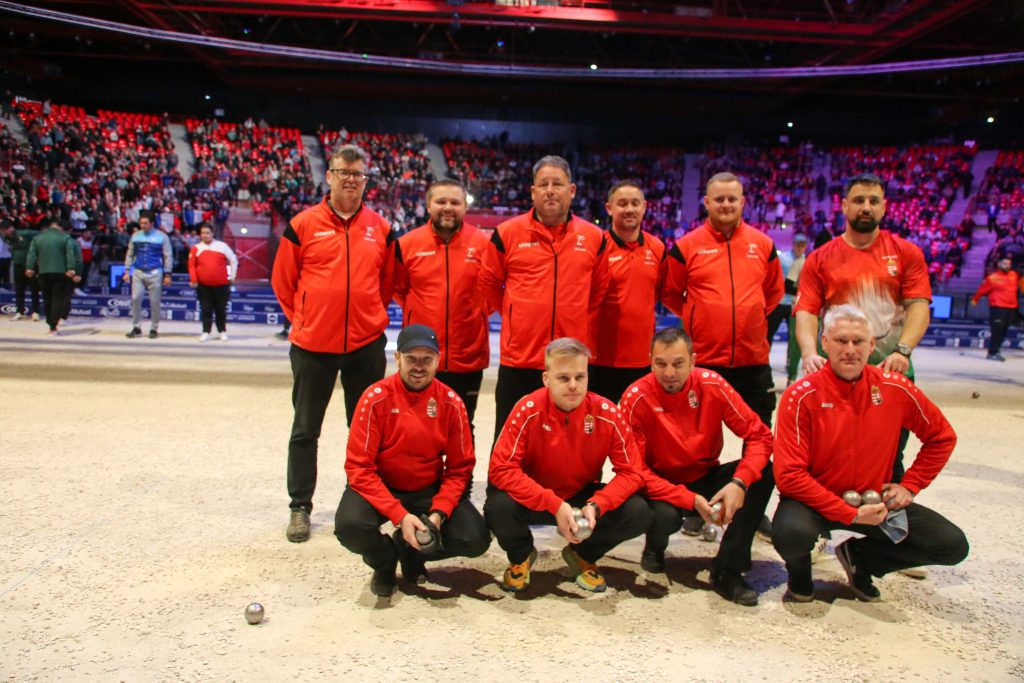
For the final round of the Swiss, which was only relevant in results terms in placing teams in the barrage groups of the Nations Cup, England returned to the big tent where their opponents were Poland, also with the single win out of four. England found their feet again in this match, winning convincingly 13-6, leaving them with two wins and a BHN (Buchholz score – the sum of England’s opponents’ wins) of 10, meaning that on average the teams England faced won on average two matches out of five.
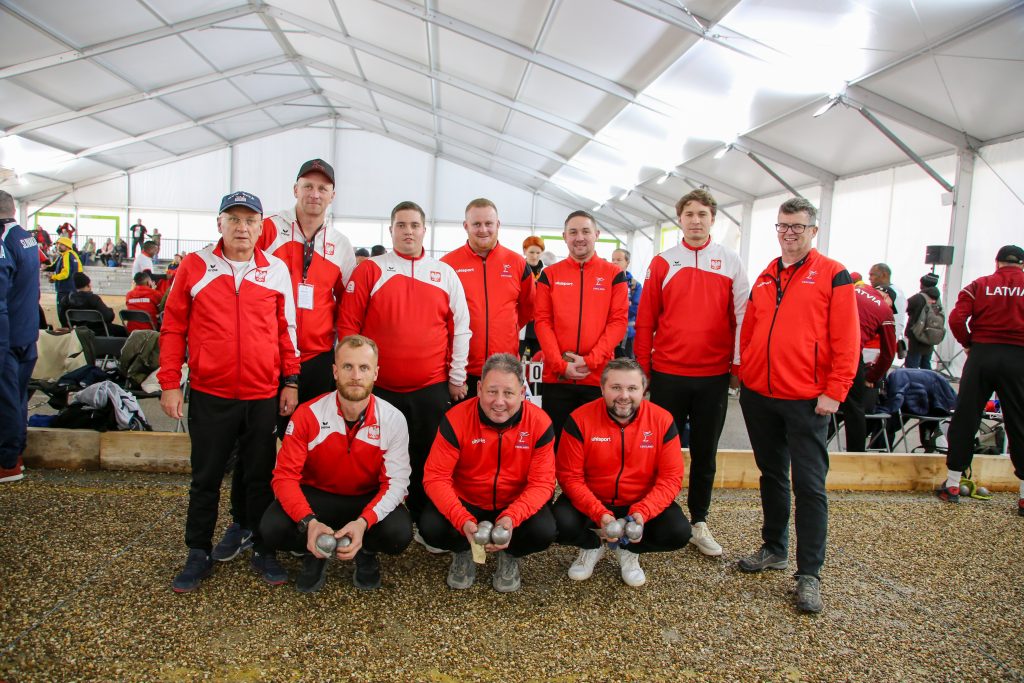
Nations Cup
The 35th ranking out of 48 teams saw England placed in a barrage group which included Japan and Latvia. The format was that the highest ranked team Latvia (29th, with two wins and a BHN of 13) got a bye while the lower ranked teams played first. The winner of the match would then play Latvia, with the winner in the second match qualifying for the knockout stage of the Nations Cup.
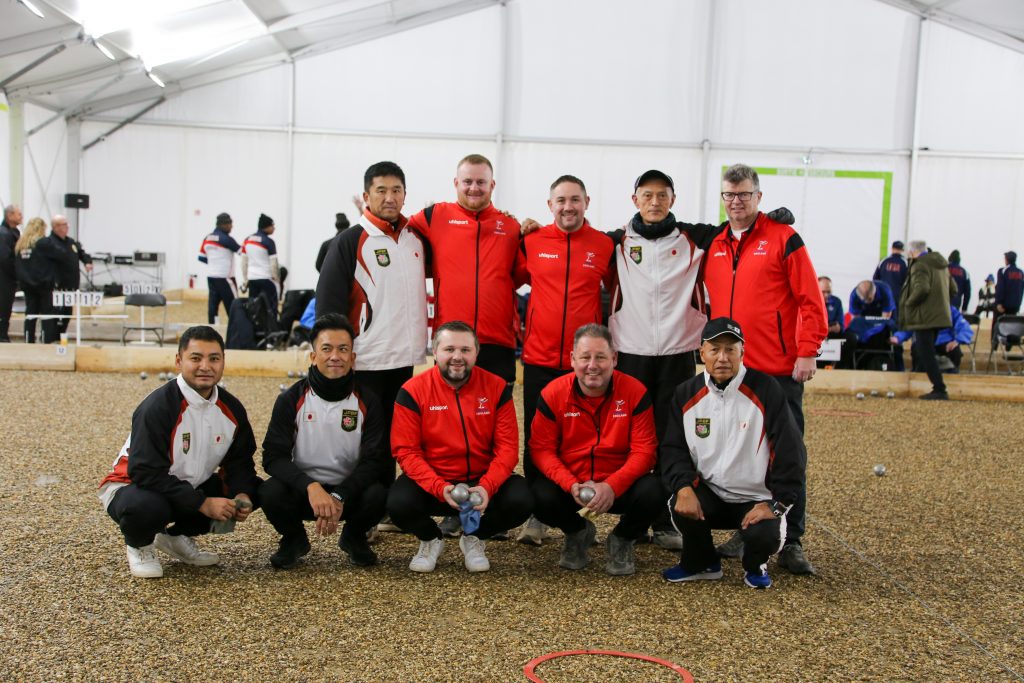
Back out in the tent again, England were way too strong for Japan and came out on top easily 13-1, setting up the match against Latvia. This proved to be a closer match with the Baltic country having improved markedly at the top level of the game over recent years, but a solid performance by England saw the team win 13-9 and also avoid a re-match against Japan.
Having won the barrage group, the tournament system then set the team up for a knockout match in the round of 16 against a second placed barrage group winner which turned out to be Scotland, who had defeated Argentina 11-9 in their group playoff match after both countries had lost to Congo.
The Home Nations showdown was scheduled to take place in the main arena after the tent had suffered a deluge of water following protracted monsoon-like conditions in Dijon. The run off from the hard standing outside had simply overwhelmed the timber edging the temporary structure.
Scotland had won two matches in the Swiss qualification, defeating New Zealand and China, but they proved to be no match for England who cruised to a 13-2 victory. The win meant that success in the next match would set up a semi final tie.
The tournament bracket set up the ‘Ashes’ against Australia, who had only secured a single win in the Swiss qualification, but who had been performing better in the Nations Cup with wins against Ukraine in the barrage after losing against Slovakia, followed by a win in the knockout stage against New Zealand.
The match ended up being a lengthy and tense affair with England seemingly in a strong position when the whistle indicated the final ends of the encounter. Unfortunately the momentum switched to Australia after England were 9-7 up with two many English errors in the concluding ends leading to a 10-9 victory for Australia.
In the Championship itself, the large and enthusiastic French crowd saw their team of serial world champions eliminated convincingly 3-13 by Madagascar in the semi final while in the final itself there was another surprise as Italy then prevailed 13-11 over Madagascar who were clear favourites to put on the multi-coloured champions jerseys. Italy had fought incredibly hard in the knockout round, especially in the stand out match of the tournament against Benin, winning by a single point in a high quality and very exciting contest.
Short of qualification for the main competition
This was a tournament that started very well for England but the team could not achieve a consistent level of performance. The turning point looking back was probably the close match against Denmark where the team had good chances to win. Once inside the main arena, disappointing performances followed against Taiwan and Hungary which meant that the teams didn’t give themselves a chance to make the main Championships, which is always the target.
Although three good wins were achieved in the Nations Cup, these were against nations where England would be considered be be favourites and there was the ultimate disappointment in not seeing out the final match against Australia with England in a seemingly strong position when the whistle blew in the timed game.
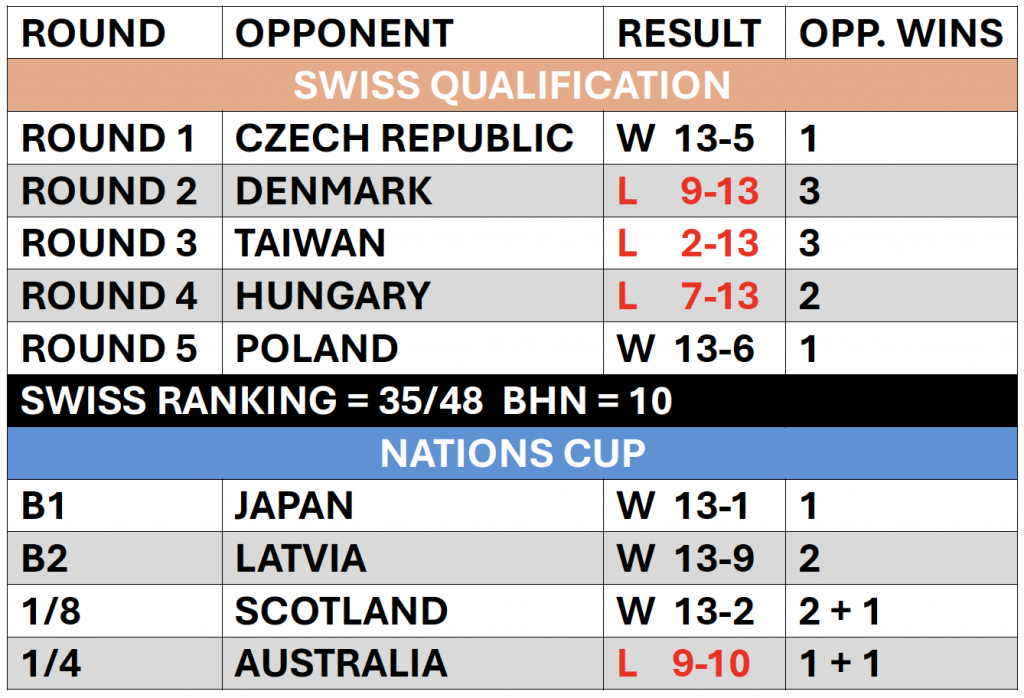
The spirit and togetherness of the team is to be applauded and the great support from the coach and head of delegation was clear to everyone present supporting the team. This is the toughest tournament on the planet and many of the teams and players present benefit from far more financial and playing resources including top class indoor facilities which English players can only dream of.
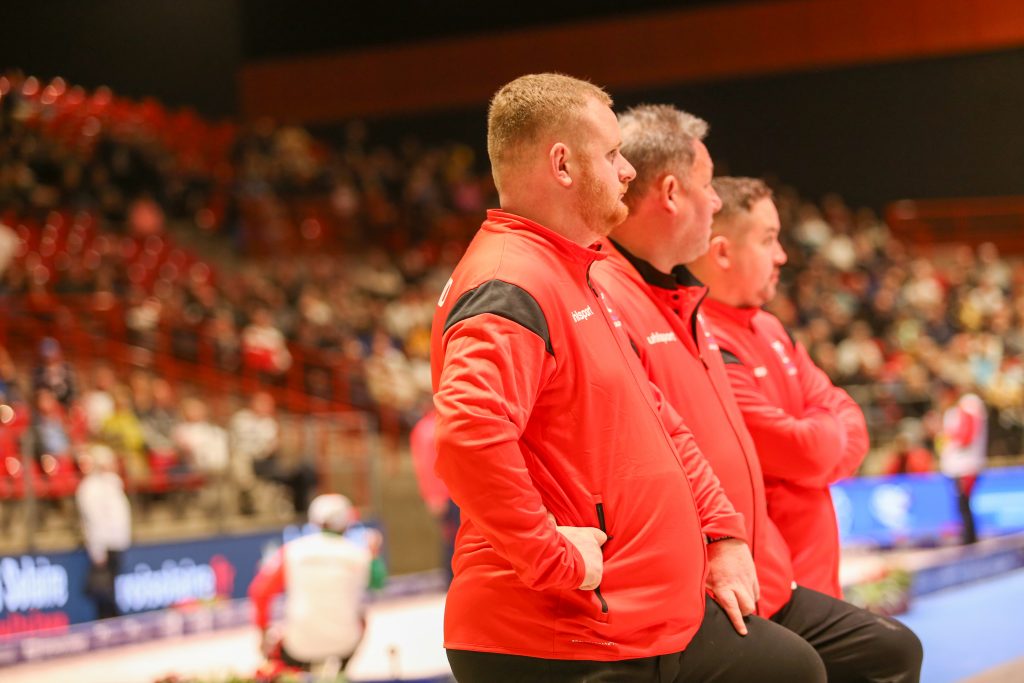
Jeremy’s performance in the Precision Shooting was on the other hand way above what we have achieved in recent years in terms of a ranking and that should be definitely celebrated. As usual, there are fine margins, and taking our chances in the second round against Denmark would’ve meant just one further win required to qualify for the main competition. The pressure and performance required at this level the game are always high and consistency along with momentum are always key.
With changes to the qualification rules pending for the next World Championships, failure to make the top 24 means that England will have to compete in some yet to be decided qualification process which could well be detached from the European Championships. We’ll update on that when this becomes clearer and you can read the background to the reform of the system here.














Add Comment